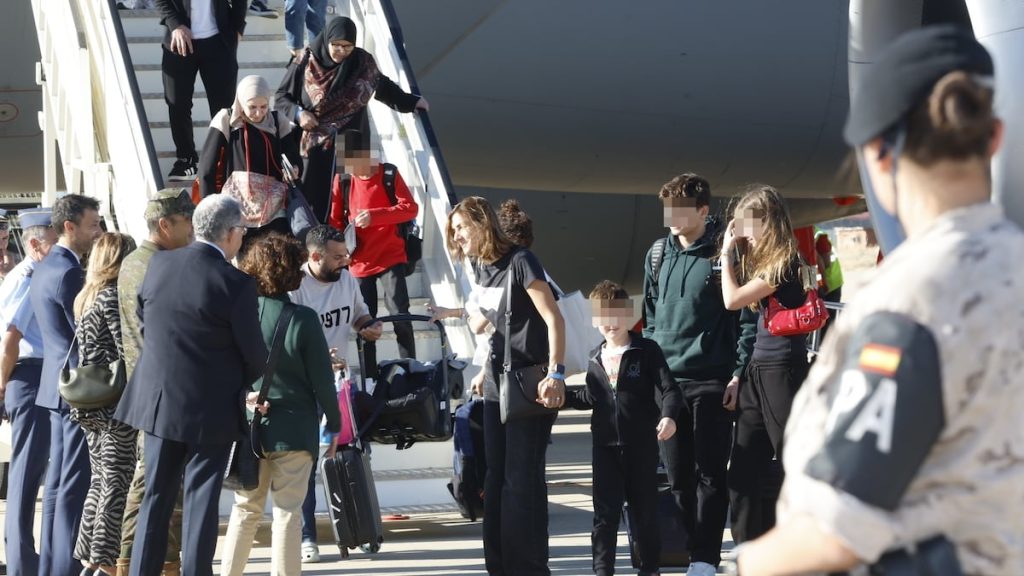Nazem Hechimi’s first greeting with his wife, Maghi Issa, was through glass. She had just gotten off the A330 that had brought her from Beirut to the Torrejón de Ardoz air base in Madrid. He had arrived an hour earlier from Salamanca to pick her up. He had encountered two traffic jams and feared arriving late and not being able to reach her as soon as she got off the plane. It was the first flight that the Spanish Air and Space Force had arranged to evacuate Spaniards and their families from Lebanon, two weeks after Israel released the first bombings in Lebanese territory and launched a ground incursion in the south of the country. The line to pass through security and pick up luggage felt endless. They could barely see each other, but could not hear each other. Tears of relief slipped from her eyes at seeing him again and stepping on Spanish territory. He, more reserved, did not want to break down.
Nazem and Maghi had spent the night awake. Just in the afternoon of Wednesday, they had learned of the possibility that she could board one of the evacuation flights. He had been in contact with the Ministry of Foreign Affairs and the Lebanese Embassy in Spain all afternoon to secure a spot for his wife. The first calls were not encouraging: they would only bring Spanish citizens, they said. He is a Spanish national, but she is not. Finally, around nine in the evening, they confirmed that she could board and that she had to be at the Beirut airport at six in the morning. Neither could sleep. She packed her suitcase and left for the airfield around two in the morning. He followed her every move through WhatsApp.
The news that Spain would send planes to Lebanon in an evacuation plan was announced by Defense Minister Margarita Robles on Wednesday morning. The government had decided this after the situation worsened deeply following Israel’s ground incursion and Iran’s response, launching around 200 missiles into Israeli territory. The evacuation operation, as the minister had announced, would bring back almost 400 Spaniards. Around four in the afternoon on Thursday, twenty family members of those coming on the first flights crowded against the gate separating them from the runway at the Torrejón base. The security officer warned: “When [the evacuees] arrive, I don’t want to see anyone crossing the door or security filters.” The instruction was to wait for their relatives to exit before leaving with them. For those who had no one to pick them up at the base, five buses would take them to various train stations in Madrid. Nazem had a bottle of water and a couple of sandwiches for his wife. “I don’t know if they fed her,” he said.
On Maghi’s flight, there were 240 people. She came from the north, from the city of Tripoli, with less than 500,000 inhabitants. “In the north, people are afraid because many are fleeing from the south and there is fear that among them may be members of Hezbollah, and Israel may detect it, because we know that Israel does not distinguish civilians, they do not care,” says Nazem while waiting for his wife to go through the security filters. He knows what he is talking about. In the last war, that of 2006, when Israel and Hezbollah also fought, his brother was in Lebanon and also had to be evacuated to Spain. Mohammed’s family, on the other hand, came from the south. From the small village of Harouf, near Nabatieh, about 20 kilometers from the border. The same area where Israel dropped the first bombs and where the land invasion began. On the flight were his wife and his three daughters, aged 10, 14, and 17, all wearing hijabs. He took a train from Barcelona, where he owns a restaurant, and upon arrival in Madrid, he rented a car to get to the Torrejón base. When the plane was still taxiing on the runway, Mohammed ran to the security gate to see them getting off the plane. “This time it seems that the war will last a long time; Hezbollah is also prepared. Israel will come in, it will take time, but it will come in,” he lamented while waiting for them. When they passed through the filter, his daughters jumped on him and then the five of them embraced as if they were one. His wife burst into tears. The terror was over.
Nazem and Maghi, married for 12 years, had not seen each other for a year, the last time she visited him. He works as an optometrist in Salamanca, and she is a journalist for the state news agency in Lebanon for over three decades. The devaluation of their country’s currency by over 90% has not allowed her to retire and come to Spain with her husband because then her severance pay, when converted to euros, would be worthless. When she finally picked up the 23-kilo suitcase she boarded the flight with, she crossed the door and surrendered herself to Nazem’s arms. “Now I am at peace, but my family is still there.” The relief is not complete: she leaves behind a brother in Beirut.


